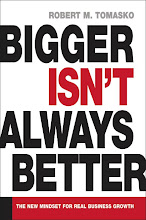January 04, 2006
Bigger is no better (and may be worse)
A journal on children’s medicine might seem like a strange place to go for lessons about management, but the current issue of Pediatrics provides one. It reports:
Why? The doubled risk of SUV rollovers totally cancels out the safety advantages of their greater size and weight. (The higher cost of fueling them may also limit children’s educational attainment by forcing parents to dip into savings for the kid’s college tuition, too. The study didn’t consider this, though.)
Bottom-line on the SUV, according to the health researchers: Bigger = Safer is a myth. This is a lesson with some implications for businesses that feel a need to bulk-up to survive aggressive competitors. The side effects of all the extra bulk may provide no net advantage, and may even be counterproductive.
Bruce Aylward, the driving force behind the World Health Organization effort to eradicate polio from the planet (and whose management tactics are profiled in Bigger Isn’t Always Better) used this insight to pull his immunization effort out of a bad tailspin last year. He discovered the standard oral polio vaccine, designed to fight all three types of polio, wasn’t producing immunity as fast as a streamlined version that targeted only the most common virus. So WHO rushed into production doses of the more focused stuff. Thanks to this approach, polio has recently disappeared from Egypt and is about to be history in India.
Children are no safer riding in sport utility vehicles than in passenger cars.
Why? The doubled risk of SUV rollovers totally cancels out the safety advantages of their greater size and weight. (The higher cost of fueling them may also limit children’s educational attainment by forcing parents to dip into savings for the kid’s college tuition, too. The study didn’t consider this, though.)
Bottom-line on the SUV, according to the health researchers: Bigger = Safer is a myth. This is a lesson with some implications for businesses that feel a need to bulk-up to survive aggressive competitors. The side effects of all the extra bulk may provide no net advantage, and may even be counterproductive.
Bruce Aylward, the driving force behind the World Health Organization effort to eradicate polio from the planet (and whose management tactics are profiled in Bigger Isn’t Always Better) used this insight to pull his immunization effort out of a bad tailspin last year. He discovered the standard oral polio vaccine, designed to fight all three types of polio, wasn’t producing immunity as fast as a streamlined version that targeted only the most common virus. So WHO rushed into production doses of the more focused stuff. Thanks to this approach, polio has recently disappeared from Egypt and is about to be history in India.
